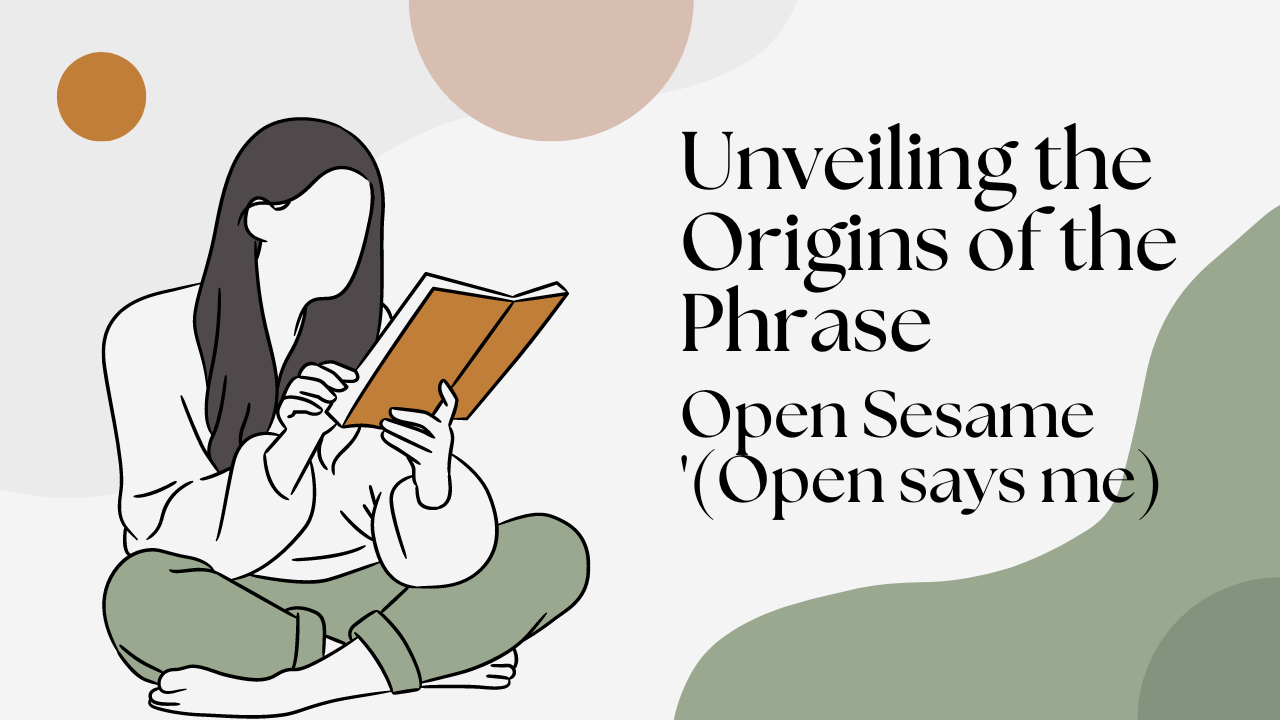The captivating expression “open sesame” effortlessly weaves itself into our everyday conversations, yet its true significance and origins remain enshrouded in mystery. This article embarks on an in-depth journey into the intriguing history behind this phrase, tracing its lineage and delving into various interpretations, while also exploring its cultural impact and enduring presence in modern language.
Contents
The Birth of “Open Sesame”
The story of “Open Sesame” takes us back to the timeless narrative of Ali Baba and the Forty Thieves, an enthralling episode from the renowned collection, One Thousand and One Nights. In this saga, the phrase “open sesame” emerges as a powerful command, akin to a magical spell that grants access.
At the center of the tale is Ali Baba, a humble woodcutter who stumbles upon a concealed cave full of plunder of forty marauders. With the mere utterance of “open sesame,” the cave’s entrance obeys, unveiling its treasures. Likewise, the command “close sesame” seals the cave’s secrets. Ali Baba, with the clever assistance of the slave girl Morgiana, thwarts the malevolent plans of the thieving gang in a thrilling twist.
Unraveling the Mystery of Authorship
The story of Ali Baba remains an enigma, as its true authorship sparks debate. While the stories within One Thousand and One Nights have traversed centuries, certain iconic narratives like Ali Baba and the Forty Thieves were absent from the original Arabic compilation.
Instead, it was Antoine Galland, an erudite linguist of the early 18th century, who introduced Ali Baba to the Western world through his French translation. Galland claimed to have heard the story from a Syrian merchant and storyteller.
Intriguingly, Diyab’s rendition differed from other versions, sparking speculation that he might have crafted this captivating story himself. This captivating ambiguity endures, with some scholars even suggesting that Galland himself could be the ingenious architect behind Ali Baba’s exploits.
Decoding the Essence of “Open Sesame”
The true essence of “open sesame” remains tantalizingly elusive, giving rise to various interpretations and theories. While the modern understanding often attributes the phrase to requesting immediate entry, its precise connotation remains a puzzle. Within this enigma, three compelling theories emerge, each vying for recognition.
Theory 1: A Glimpse of Hebrew Origins
One theory ventures into the realm of Hebrew etymology, proposing a link between “open sesame” and the Hebrew word “סיסמה” (sisma), meaning “password.” The phonetic similarity between “sesame” and “sisma” raises the possibility of a linguistic connection.
This idea is supported by Ali Baba’s use of the phrase to reveal the cave’s treasures. Nevertheless, linguistic analysis points out that “sesame” is a Greek and Latin word that refers to sesame seeds.
Theory 2: Seeds of Symbolism
A more literal perspective suggests that “open sesame” might symbolize the act of opening sesames, revealing the revelation of concealed abundance. This interpretation finds echoes in the ancient Babylonian practice of employing sesame oil in rituals. Nonetheless, while this theory weaves an intriguing narrative, its connection to the phrase remains somewhat tenuous.
Theory 3: A Thread of Germanic Influence
Drawing from Germanic folklore, the story of Similiberg, intertwined with the Brothers Grimm’s fairy tales, presents an alternate viewpoint. In this tale, a treasure is safeguarded within a mountain, accessed through the phrase “Berg Semsi, Berg Semsi, tu dich auf” – translating to “Semsi mountain, Semsi mountain, open.”
Some scholars speculate that this Germanic tale might have inspired Galland’s creation, intertwining the essence of “open sesame” with the term “semsi,” an archaic Germanic word for “mountain.”
Tracing Linguistic Shifts
The intricacies of translation have further enveloped the phrase “open sesame” in a linguistic dance. A line in Ali Baba and the Forty Thieves becomes “open, O Simsim” in English renditions, bridging the linguistic gap.
This transformation stems from Galland’s French rendition, where Ali Baba declares “Sésame, ouvre toi!” Burton’s interpretation adeptly mirrors the Arabic original, carrying forward the phrase’s legacy through linguistic metamorphosis.
Dispelling the Myth: “Open Says Me”
Popeye the Sailor Meets Ali Baba’s Forty Thieves in 1937 provides a playful twist to the narrative. Amidst his spinach-induced feats, Popeye exclaims “Open, says me!” as a whimsical reference to the familiar phrase. This jest, however, has subtly woven its way into popular belief, fostering the notion that “open sesame” could be more accurately rendered as “open says me.”
A Lingering Lexicon
In the vast tapestry of language, the phrase “open says me” has transcended its origins, firmly embedding itself within the fabric of everyday discourse. While the exact meaning and source of the phrase remain shrouded in mystery, its enduring presence is undeniable. The phrase “open sesame” continues to grace conversations, serving as a unique reminder of a timeless story.
Cultural Impact and Contemporary Usage
Beyond its origins and linguistic intricacies, “open sesame” has etched itself into cultural memory. This phrase has seamlessly integrated into various facets of modern life, from literature and film to everyday idiomatic expressions.
Its legacy extends to a wide range of contexts, from technological advancements to the entertainment industry. Symbolizing hidden truths and limitless possibilities in an access-driven world, the phrase still resonates today.
The Symbolism of Entrance
“Open sesame” transcends its literal meaning, embodying a symbolic resonance that speaks to the human desire for discovery and exploration. People across cultures and generations continue to search for new experiences, knowledge, and opportunities based on that phrase. Its popularity confirms its role as a metaphorical key that unlocks the door to curiosity and potential.
A Bridge Between Worlds
Language has the remarkable ability to bridge gaps and connect disparate realms. “Open sesame” exemplifies this linguistic bridge, linking ancient folklore to contemporary conversations. As a phrase that has transcended time, culture, and linguistic barriers, it demonstrates the unifying power of human communication. Our world has become increasingly globalized, and this phrase reminds us of our common narratives.
Conclusion
The captivating charm of the phrase “open sesame” lies not only in its cryptic beginnings but also in its multifaceted interpretations and profound cultural impact. It embodies the rich evolution of language from Ali Baba and the Forty Thieves to the present day.
Its enduring significance and intricate history lead us to a certain conclusion. “Open sesame” shall forever stand as a gateway bridging the worlds of mystery, culture, and language.
You can also read:



